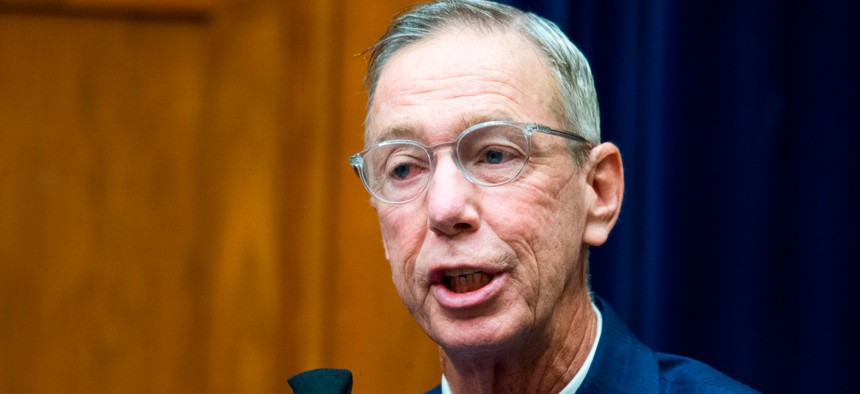
Rep. Stephen Lynch, D-Mass., is introducing legislation to strengthen accountability on embassy construction. TOM WILLIAMS/POOL/AFP via Getty Images
Lawmaker Looks to Increase Congressional Oversight of Embassy Projects
A new bill comes in response to issues identified in the construction of a new embassy compound in Ashgabat, Turkmenistan.
A House Democrat will introduce legislation on Friday that would increase Congress’ oversight of embassy construction projects, following concerns the congressman previously raised regarding construction of a new embassy compound in Ashgabat, Turkmenistan and the cost to taxpayers.
Rep. Stephen Lynch, D-Mass., chairman of the House Oversight and Reform Committee's panel on national security, will unveil the Embassy Construction Accountability Act. Building on a letter he sent to the State Department in April, Lynch and his subcommittee found “the [new embassy compound in Ashgabat] has suffered from years of construction errors, significant gaps in administrative oversight and wasteful spending, exposing the need for greater congressional oversight of embassy construction projects,” said a new fact sheet. The State Department issued the initial contract for this project in September 2014.
“Significant delays in U.S. embassy construction projects impair the effectiveness of our foreign missions, threaten the safety of diplomatic, consular and other U.S. personnel stationed overseas, and often come at the expense of U.S. taxpayer dollars,” said Lynch, in a statement provided to Government Executive.
He said his proposed bill, shared exclusively with Government Executive ahead of its introduction, will increase Congress’ oversight of projects, specifically by allowing “Congress to more quickly identify serious lapses during embassy construction and promptly work with the State Department to ensure these critical projects are completed on-time and on-budget and serve the interests of U.S. national security and the American taxpayer.”
In regard to the situation in Ashgabat, the new embassy compound is meant to replace the current U.S. diplomatic facilities that are located throughout the city, overcrowded and possibly unsafe, said the fact sheet. However, it now won’t likely be completed until some point in 2026 and is expected to cost at least $327.5 million, which is $131 million more than first anticipated, according to the subcommittee.
In July 2016, the Turkmenistan government ordered the State Department and Caddell to cease construction on the new embassy compound because the chancery, referred to as the new office building, was not being constructed in accordance with local regulations. The information put out by the subcommittee and a February 2020 inspector general report detail the problems and allegations that have ensued over the years.
“In June 2022, the [State] Department and Caddell executed an agreement based on what the department called ‘a model of shared responsibility,’” said the fact sheet. “This agreement settled both parties’ claims against the other related to the misplacement of the [new office building] and subsequent delays. The department then issued a second contract modification that increased the project’s total cost by $4.8 million.”
A State Department spokesperson told Government Executive they don’t comment on pending legislation.
“The department values our coordination and collaboration with our important congressional partners,” the spokesperson continued. “With a complex global facilities portfolio, we strive to optimize the dynamic work of constructing and maintaining the U.S. diplomatic platform around the world despite the physical, financial, security, and bilateral political challenges."
Caddell did not respond for comment.
According to Freedom House, a nonprofit that conducts research on and advocates for democracy, human rights and political freedom, Turkmenistan’s “economy is dominated by the state, corruption is systemic, religious groups are persecuted and political dissent is not tolerated.”
The State Department and Caddell “were primarily responsible for failing to abide by local regulations,” said a spokesperson for the subcommittee when asked if the government caused any issues.
Asked if the subcommittee has observed similar issues with embassy projects in other countries, the spokesperson said the House Oversight and Reform Committee “has a long record of conducting oversight of embassy construction projects, including in Iraq and Afghanistan” and the “U.S. Embassy in Ashgabat is not the first State Department construction project to experience delays and cost overruns, but the factors that contribute to such mishaps vary by embassy and their unique circumstances.”
This story has been updated with comment from the State Department.







